 MyDogBreeds
MyDogBreeds South Russian Ovcharka is originated from Russia but Bearded Collie is originated from United Kingdom. South Russian Ovcharka may grow 11 cm / 5 inches higher than Bearded Collie. South Russian Ovcharka may weigh 25 kg / 56 pounds more than Bearded Collie. South Russian Ovcharka may live 4 years less than Bearded Collie. South Russian Ovcharka may have less litter size than Bearded Collie. South Russian Ovcharka requires Moderate maintenance. But Bearded Collie requires High maintenance
South Russian Ovcharka is originated from Russia but Bearded Collie is originated from United Kingdom. South Russian Ovcharka may grow 11 cm / 5 inches higher than Bearded Collie. South Russian Ovcharka may weigh 25 kg / 56 pounds more than Bearded Collie. South Russian Ovcharka may live 4 years less than Bearded Collie. South Russian Ovcharka may have less litter size than Bearded Collie. South Russian Ovcharka requires Moderate maintenance. But Bearded Collie requires High maintenance
 Known also as the South Russian Sheepdog or the Ukranian Shepherd Dog, the South Russian Ovcharka’s history isn’t well established, and there are different stories to its history.
Known also as the South Russian Sheepdog or the Ukranian Shepherd Dog, the South Russian Ovcharka’s history isn’t well established, and there are different stories to its history.
Whatever their history, this large dog is closely related to the wolf and has also been crossed with sight hound dogs. Their numbers have been under threat when their role as herding dog was no longer needed for rural life.
It was in the 1920s however that the breed’s numbers were restored and the UKC officially recognised the South Russian Ovcharka in 1996.
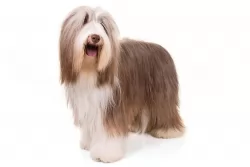 This long-haired herding breed was bred by mixing the two sheepdog breeds: the Scottish dogs and the Polish sheepdogs. The Bearded Collie gained the popularity during the last century by winning some of the Dog Shows. This friendly dog with the beautiful coat is surely one of the most specific pets. Nowadays, the Bearded Collie is very popular. The organizations for breeding, saving, rescuing and adopting this breed can be found in the USA.
This long-haired herding breed was bred by mixing the two sheepdog breeds: the Scottish dogs and the Polish sheepdogs. The Bearded Collie gained the popularity during the last century by winning some of the Dog Shows. This friendly dog with the beautiful coat is surely one of the most specific pets. Nowadays, the Bearded Collie is very popular. The organizations for breeding, saving, rescuing and adopting this breed can be found in the USA.
 A large, big boned, well muscled herding dog, the South Russian Ovcharka stands at between 62 and 66cm in height and weighs between 46 and 52kg.
A large, big boned, well muscled herding dog, the South Russian Ovcharka stands at between 62 and 66cm in height and weighs between 46 and 52kg.
The dog has a thick, fairly coarse, weather-proof coat that can become long and this coat has always protected them from the harsh Russian winters.
He has small, floppy ears and the tail is medium length and also covered in thick fur.
These dogs need a lot of exercise and if you keep one as a pet he will need a lot of space to run and play. He guards his property too and makes a good watchdog.
He isn’t suited to living in small spaces in the city. He is a dominant, independent and strong willed dog so training and socialization will be important if you don’t want him to be unruly.
With the right kind of training, the South Russian Ovcharka can get along with pets and children in the home. He isn’t aggressive but he has strong guardian characteristics.
The first time dog owner would need to be firm, strong, confident, consistent and kind to handle this strong willed dog.
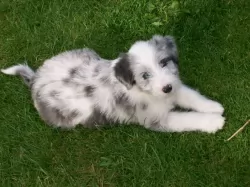 The Beardie is easy to recognize because of the longer hairs on the cheeks, chin and under the lower lip. This medium-sized Bouncing Beardie is usually the great family pet because he is very friendly and loving. This breed is extremely active and they are energetic despite their longer bodies. They grow up to have more than one coat colour, but they are all born one coloured. They always have white or cream markings. This smart dog can be very stubborn and independent, if you keep your dog in a yard, he will use every chance to escape.
The Beardie is easy to recognize because of the longer hairs on the cheeks, chin and under the lower lip. This medium-sized Bouncing Beardie is usually the great family pet because he is very friendly and loving. This breed is extremely active and they are energetic despite their longer bodies. They grow up to have more than one coat colour, but they are all born one coloured. They always have white or cream markings. This smart dog can be very stubborn and independent, if you keep your dog in a yard, he will use every chance to escape.
 The South Russian Ovcharka may well be independent and strong headed but there is nothing that a little bit of training and socialization can’t do.
The South Russian Ovcharka may well be independent and strong headed but there is nothing that a little bit of training and socialization can’t do.
He is intelligent and will pick up some obedience commands easily. He is is dog that will like a strong, firm, consistent owner - someone who likes to include him in all the family activities.
He can get on with children but is better suited to life on a larger property as opposed to living in a small city place. Treat him with firmness and fairness and you’ll get yourself an excellent pet and companion.
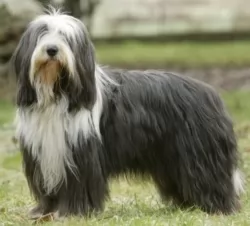 The Bouncing Beardie is great with children. They are very playful, jumpy and have generally very sweet and gentle personality. Children love them because they never get tired. If properly socialized, this dog can be the main attraction for any child.
The Bouncing Beardie is great with children. They are very playful, jumpy and have generally very sweet and gentle personality. Children love them because they never get tired. If properly socialized, this dog can be the main attraction for any child.
Herding, agility shows, obedience competitions, treibball, show dogs, trally...
This breed is very friendly. If your family is about to raise the Bearded Collie, prepare to have a pet that is highly affectionate and bonded with the members of the family. They don’t do well if left alone. They usually don’t bark and they are never destructible, but loneliness somehow triggers odd behaviour with this breed. They are not usually scared of strangers. If they are trained and socialized, you will be able to take your Beardie anywhere you go.
Some say that is very easy to train the Bearded Collie. The rule for this breed is to start the obedience training while they are very small. They are generally very independent, and they will try to do things in their own way. If you start your training early before your Beardie forms this kind of personality, you will have a wonderful pet.
 This large breed has a lifespan of 9 to 11 years. Some of the health conditions to which this big dog can succumb are -
This large breed has a lifespan of 9 to 11 years. Some of the health conditions to which this big dog can succumb are -
This is something that affects many dogs, but particularly large dogs. When the hips haven’t formed properly, it can lead to pain, disability and arthritis.Lifestyle changes can help, like making sure your dog doesn’t pick up too much weight. For pain management you will need to get your pet to the vet.
Also known as Gastric Dilatation. The dog’s stomach fills with gas and can twist, and this in itself can be fatal. As soon as you see your pet pacing restlessly and he has a swollen stomach, he will need to get to the vet just as soon as possible.
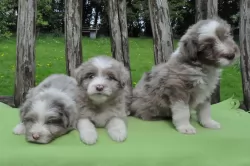 This breed is generally very healthy. They don’t have some major health issues. Some of the issues that are registered are:
This breed is generally very healthy. They don’t have some major health issues. Some of the issues that are registered are:
The degenerative disease that causes the blindness.
When the hormone produced by the thyroid gland is abnormally low.
That is generally the hereditary disease, can also be caused by bad diet or injuries.
To food, chemicals, pollen, dust...
That usually happens because of their dropped ears that are not very easy to clean.
 The long coat is certainly going to need a good brush at least twice a week as it can so easily become matted.
The long coat is certainly going to need a good brush at least twice a week as it can so easily become matted.
Because he has floppy ears, you will need to check inside the ears that they aren’t showing signs of redness, indicating the possibility of a ear infection. Check at the same time for ticks and fleas.
This dog is going to need a good deal of exercise to keep him content. He will love a long walk out and about. Robust games will also need to be provided. It’s why he isn’t looked upon as a dog suited to the city. He needs a lot of space and can become frustrated and destructive if his exercise needs aren’t met.
A dog is part of the family and he therefore deserves a good meal too. Good food is beneficial as it means your dog is less likely to get sick.
Like many dog owners, you’ll no doubt appreciate the convenience of commercially manufactured dog foods. You’ll need to choose the best one though because the inferior ones are made up of bad ingredients – fillers that have no goodness whatsoever.
To provide your South Russian Ovcharka with a tasty treat, try and give him some home-made food. Boiled chicken, rice or pasta, sweet potatoes, carrots and spinach are simple and tasty and won’t trouble your dog’s stomach.
Chop some of it up and add a small portion of this into his dry kibble twice a week. Your dog’s wagging tail will tell you how much he loves it.
To avoid skin infections, try to include some raw meat into his diet too when you can. Make sure your dog has a constant supply of fresh, cool water.
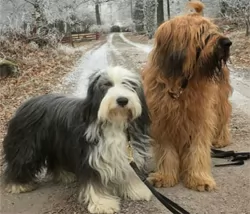 Raising your Bearded Collie pup on a high-quality food is usually enough for a puppy. Make sure that portions are appropriate for his age and weight. Once your pet is more than six months old, they will need only two meals per day. They get obese very easy. Don’t train them with the treats.
Raising your Bearded Collie pup on a high-quality food is usually enough for a puppy. Make sure that portions are appropriate for his age and weight. Once your pet is more than six months old, they will need only two meals per day. They get obese very easy. Don’t train them with the treats.
To care for your Bearded Collie, you must be aware of the grooming responsibilities that come with this longhaired pet. During the shedding period, it is required to brush them daily. Bathing is not a regular necessity but it will be easier to keep him clean and well groomed if you care about your pet all the time. Some people like to shorten the coat for their Beardie, and it is usually done during summer. Make sure to take him to regular ear, eye, teeth and hip vet checks.
The Bearded Collie is a breed that requires daily activity. They have very playful nature and they love to run, play and spend time outdoors. The best option will be a big yard so that Beardie can run for hours without the leash.